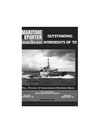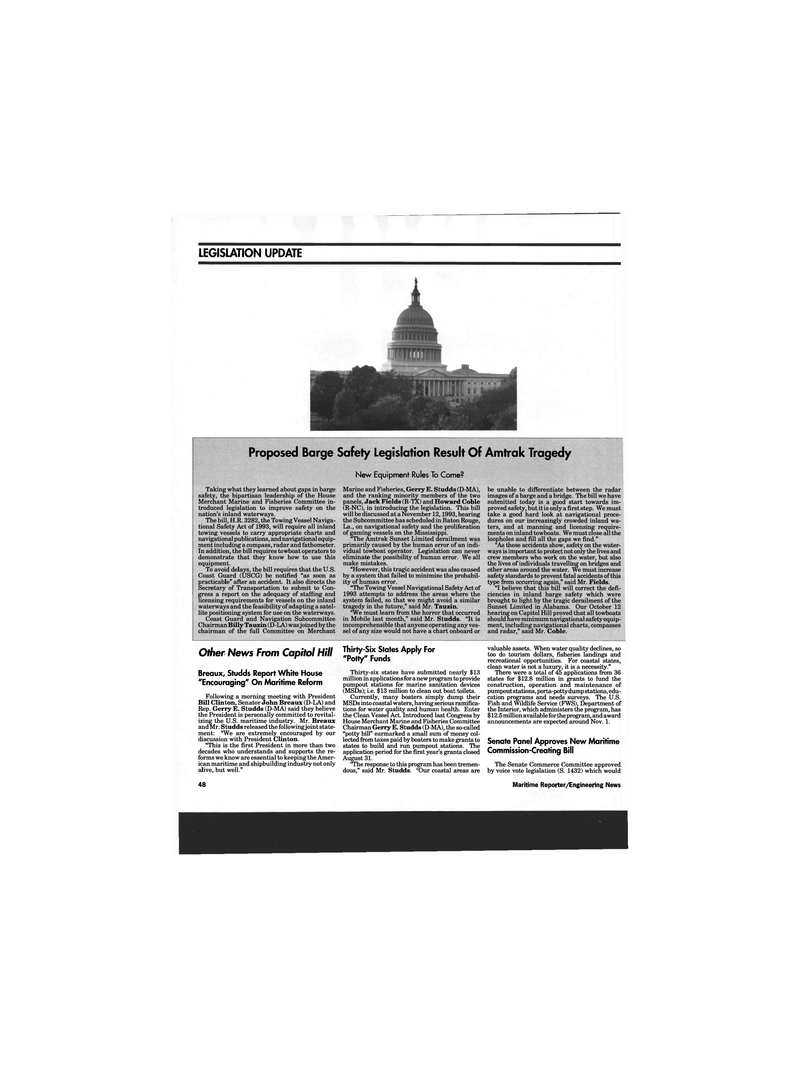
Page 46: of Maritime Reporter Magazine (November 1993)
Read this page in Pdf, Flash or Html5 edition of November 1993 Maritime Reporter Magazine
LEGISLATION UPDATE
Proposed Barge Safety Legislation Result Of Amtrak Tragedy
Taking what they learned about gaps in barge safety, the bipartisan leadership of the House
Merchant Marine and Fisheries Committee in- troduced legislation to improve safety on the nation's inland waterways.
The bill, H.R. 3282, the Towing Vessel Naviga- tional Safety Act of 1993, will require all inland towing vessels to carry appropriate charts and navigational publications, and navigational equip- ment including a compass, radar and fathometer.
In addition, the bill requires towboat operators to demonstrate that they know how to use this equipment.
To avoid delays, the bill requires that the U.S.
Coast Guard (USCG) be notified "as soon as practicable" after an accident. It also directs the
Secretary of Transportation to submit to Con- gress a report on the adequacy of staffing and licensing requirements for vessels on the inland waterways and the feasibility of adapting a satel- lite positioning system for use on the waterways.
Coast Guard and Navigation Subcommittee
Chairman Billy Tauzin (D-LA) was joined by the chairman of the full Committee on Merchant
New Equipment Rules To Come?
Marine and Fisheries, Gerry E. Studds (D-MA), and the ranking minority members of the two panels, Jack Fields (R-TX) and Howard Coble (R-NC), in introducing the legislation. This bill will be discussed at a November 12,1993, hearing the Subcommittee has scheduled in Baton Rouge,
La., on navigational safety and the proliferation of gaming vessels on the Mississippi. "The Amtrak Sunset Limited derailment was primarily caused by the human error of an indi- vidual towboat operator. Legislation can never eliminate the possibility of human error. We all make mistakes. "However, this tragic accident was also caused by a system that failed to minimize the probabil- ity of human error. "The Towing Vessel Navigational Safety Act of 1993 attempts to address the areas where the system failed, so that we might avoid a similar tragedy in the future," said Mr. Tauzin. ^Ne must learn from the horror that occurred in Mobile last month," said Mr. Studds. "It is incomprehensible that anyone operating any ves- sel of any size would not have a chart onboard or be unable to differentiate between the radar images of a barge and a bridge. The bill we have submitted today is a good start towards im- proved safety, but it is only a first step. We must take a good hard look at navigational proce- dures on our increasingly crowded inland wa- ters, and at manning and licensing require- ments on inland towboats. We must close all the loopholes and fill all the gaps we find." "As these accidents show, safety on the water- ways is important to protect not only the lives and crew members who work on the water, but also the lives of individuals travelling on bridges and other areas around the water. We must increase safety standards to prevent fatal accidents of this type from occurring again," said Mr. Fields. "I believe that this bill will correct the defi- ciencies in inland barge safety which were brought to light by the tragic derailment of the
Sunset Limited in Alabama. Our October 12 hearing on Capitol Hill proved that all towboats should have minimum navigational safety equip- ment, including navigational charts, compasses and radar," said Mr. Coble.
Other News From Capitol Hill
Breaux, Studds Report White House "Encouraging" On Maritime Reform
Following a morning meeting with President
Bill Clinton, Senator John Breaux (D-LA) and
Rep. Gerry E. Studds (D-MA) said they believe the President is personally committed to revital- izing the U.S. maritime industry. Mr. Breaux and Mr. Studds released the following joint state- ment: "We are extremely encouraged by our discussion with President Clinton. "This is the first President in more than two decades who understands and supports the re- forms we know are essential to keeping the Amer- ican maritime and shipbuilding industry not only alive, but well."
Thirty-Six States Apply For "Potty" Funds
Thirty-six states have submitted nearly $13 million in applications for a new program to provide pumpout stations for marine sanitation devices (MSDs); i.e. $13 million to clean out boat toilets.
Currently, many boaters simply dump their
MSDs into coastal waters, having serious ramifica- tions for water quality and human health. Enter the Clean Vessel Act. Introduced last Congress by
House Merchant Marine and Fisheries Committee
Chairman Gerry E. Studds (D-MA), the so-called "potty bill" earmarked a small sum of money col- lected from taxes paid by boaters to make grants to states to build and run pumpout stations. The application period for the first year's grants closed
August 31. "The response to this program has been tremen- dous," said Mr. Studds. "Our coastal areas are valuable assets. When water quality declines, so too do tourism dollars, fisheries landings and recreational opportunities. For coastal states, clean water is not a luxury, it is a necessity."
There were a total of 45 applications from 36 states for $12.8 million in grants to fund the construction, operation and maintenance of pumpout stations, porta-potty dump stations, edu- cation programs and needs surveys. The U.S.
Fish and Wildlife Service (FWS), Department of the Interior, which administers the program, has $12.5 million available for the program, and award announcements are expected around Nov. 1.
Senate Panel Approves New Maritime
Commission-Creating Bill
The Senate Commerce Committee approved by voice vote legislation (S. 1432) which would 48 Maritime Reporter/Engineering News

 45
45

 47
47
